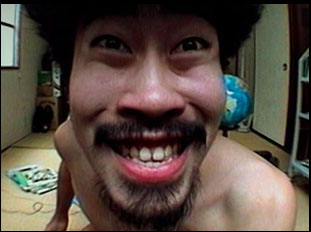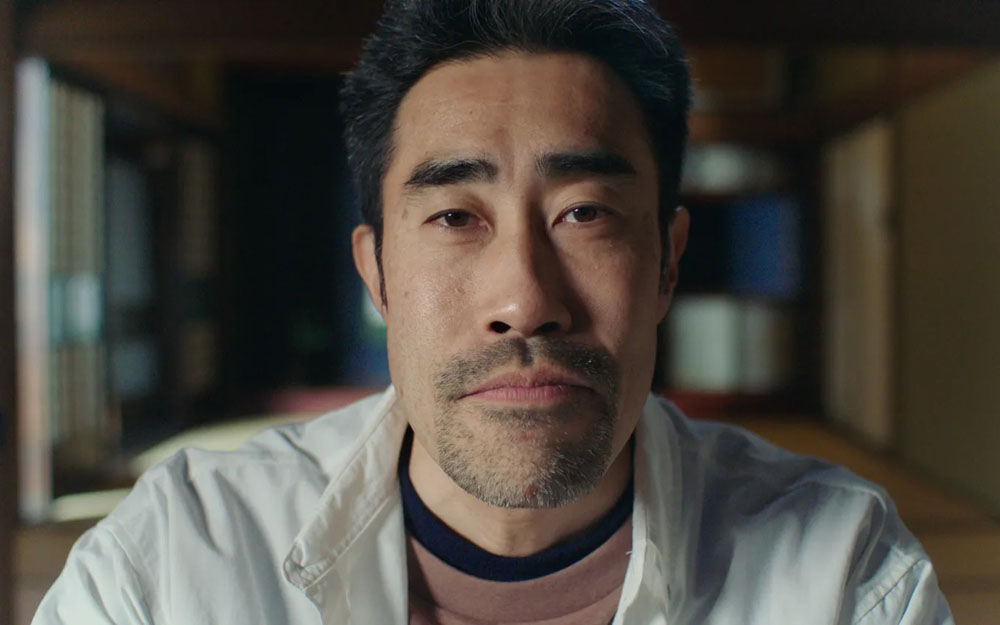“I saw it as my first big chance,” Tomoaki Hamatsu explains innocently enough about why he agreed to sign up for the reality show “Denpa Shōnen (A Life in Prizes)” in “The Contestant,” well before much was known about the genre and without knowing what the show would even really be about. A comedian in Japan, Hamatsu liked to entertain and the mere promise of being on television meant that he could put a smile on the face of millions, yet his own cheery persona would be put to the test when he was filmed 24/7 solving puzzles and playing games on which his survival was dependent when the prizes were what he could live on, whether it was rice (and then separately the pot to cook it in) or small creature comforts that might make the tiny apartment he was confined to a little more bearable over the 15 months he was inside.
Even now, Hamatsu remains a prisoner to the show, referred to almost exclusively by the nickname Nasubi he received as a result of the eggplant producers gave him as a virtual modesty patch in order to show him at all hours of the day to a general audience. But as the show became a sensation in Japan and now regarded as a precursor to such global hits such as “Big Brother” and “Survivor,” Nasubi endured the trauma of being recognized on the street for the worst experience of his life, in which he was a guinea pig for producers to test out how they could pull the most out of participants to make for a good show. While director Clair Titley’s riveting doc will inevitably be seen as a cautionary tale, it is more surprisingly a story of remarkable resilience and resolve when after all the production took from Nasubi in terms of energy and dignity, he kept his selfless desire to lift others’ spirits, open about his own long road to recovery and ultimately using his celebrity and charm to help keep morale high in his hometown of Fukushima in the wake of the devastating 2011 nuclear disaster.
With “The Contestant” now reaching millions on Hulu following its premiere last fall at the Toronto Film Festival, Nasubi has again found himself in the spotlight as Titley invites him to recall the experience on his own terms while immersing present-day audiences in the sensorial experience that first made “Denpa Shōnen” such irresistible viewing, with its overzealous color commentary reinterpreted by Fred Armisen and breathless editing. The result is captivating, only this time with a greater sense of perspective on what the true cost of such entertainment is and recently, Nasubi, Titley and producer Megumi Inman spoke about how the film was the result of sheer perseverance, from the director printing up business cards forecasting the project’s destiny to simply recovering footage from the show, which predated the rise of online video, as well as the game of table tennis that won Nasubi over.

Clair Titley: It was one of those things when you’re working on a project and you get a bit distracted by another story and then you end up down one of those internet rabbit holes. I found Nasubi’s story and before I knew it, I was a bit lost and totally fascinated by it. I just had so many questions like everybody else did about how on earth could this happen? Why did he stay in there? Why didn’t he leave? All the usual questions, but also I found that a lot of what had been written online didn’t really seem to go into depth about Nasubi’s story, and I really wanted to tell that side of things, which is why when I contacted him, that was my approach. I said, “I want to tell the human story behind this.”
Nasubi, was this something you were immediately open to? It seems like a difficult time to revisit.
Nasubi: I’ve been interviewed by radio, TVs, and radio, but the offer to make a documentary film was a special offer. All this Western media usually talks about, “Oh, you should have sued. This is a violation of human rights.” And [I thought] if this is what the movie is all about, I wasn’t really open [to it] because I did not want to be portrayed as just unhappy. Then I talked to Claire, and she said that we want to show your recovery story and what happens, and I said, “If that’s the case, I’ll give it a chance.
Is it true you first played ping pong against each other in the Isle of Wight to get to know each other?
Clair Titley: Actually, in the Isle of Wight, I’d been trying to get funding for the film and in order to be able to go shoot a [proof-of-concept] tape in Japan, Nasubi said, “Let’s just make this film. I’m coming to the UK, we’ll do it.” Which is so Nasubi. And I had this Japanese interpreter who lived down the road and I’d been paying her in tea and cookies and she had this holiday home. We went on this crazy journey and got to know each other that way, spending our evenings playing table tennis.
Nasubi: The table tennis was fun. I’d been doing it for six years when I was a student.
Clair Titley: Nasubi’s an expert player. But what was uncanny was we connected with Andee Ryder, our producer from Misfits [Entertainment], who is a huge table tennis fan as well, so remotely for years on and off, Andee and Nasubi were kind talking about having this table tennis match that was going to take place and then finally in November, [she and] Nasubi managed to have a game together. It was quite an intense moment.
Nasubi: Yeah, we talked about it so much.
Megumi, how did you get involved? From what I understand, you knew Nasubi from watching the original show.
Megumi Inman: Yeah, my mother’s Japanese and my father’s English and it just so happened that I was about 11 years old and living in Japan when Nasubi was on television in “Denpashonen.” I actually watched it as a kid and thought it was absolutely hilarious. I was completely captivated and knew all about Nasubi, but I’d obviously hadn’t thought about the program in a very long time.
It was many years later at Sheffield Documentary Film Festival, through my partner that I found out that Clair was making this documentary. In fact, my partner got a business card from Clair and all it had on it was [the name] Clair Titley and it had a TV on it and inside a photo of Nasubi, and I just thought, “Oh my God, this is a brilliant documentary [idea],” and of course this is an insane story. But as an audience member, I hadn’t seen it from the other side and when I met Clair, I thought “Anything you need like for this film to happen, please tell me,” and it blossomed from there. It’s been a wild trip.
Nasubi: I’ve never heard about the business card you made, Clair!
Clair Titley: Do you remember when we were pitching it? The amazing dolls that they created when Nasubi went up Everest, and they’re called Weebles? When you try and knock them over and they just come straight back up again, but they were shaped like an eggplant with Nasubi’s face on them. We had those every time we were pitching the idea — that was my prop that I would take around. They were presents from Nasubi.
Nasubi, when you knew there was a film being made about this, was there anything that was important for you to convey?
Nasubi: In Japan, it hasn’t been shown yet, but I was afraid that they might take it as this [story of] whistleblowing, [making] accusations, but instead of that, I want to encourage people in a weak situation or struggling or vulnerable and show that even a hard past could change and just attacking or suing people is not going to solve a problem. There are things more important than fame and money and even I hurt myself and that is the past that I have — and maybe I have it with me now, but you can change for the future by changing mentality. I hope that people will look at it as a story of recovery, and if I could deliver a little happiness to the people, [especially] the people who are in a weaker situation, a little happiness can go a long way and laughter can save the world.
Clair Titley: Can I mention something not as eloquent and beautiful as what Nasubi just said, but we really felt was important in the film — that’s Fukushima. We really wanted Fukushima to be a big part of this film. And it’s something Nasubi and I spoke about a lot at the beginning because it shaped who he is and so much a part of who he is now and he does so much humanitarian work for Fukushima, so that was something it was very important to us Fukushima had a strong presence in the film and was almost a character in itself.
It leads to a really interesting tone that must’ve been difficult to get right when it’s a story of processing trauma for Nasubi, but then you’ve got to show the sugar rush that made it such compelling viewing for an audience. Were those two things at odds in the edit or complimentary of one another?
Clair Titley: It was a hard edit, wasn’t it? When you’re dealing with comedy and horror in that way, and you find the audiences are laughing and then they stop themselves from laughing. I think it’s good that people do that, and we did a lot of work with the archive from Nippon because all we were given was what went out on air.
There were two things that we wanted to do — number one, we wanted to make it so that a Western audience could understand the onslaught that was going on, so they could see how crazy it was with all these graphics and all this noise on screen and the only way to do that without subtitles was to translate it. The magician that is Jason Martine, who did the VFX, managed to somehow painstakingly remove or cover up the Japanese graphics and put on English graphics and the amount of work that was done with the soundscape as well as is incredible. Obviously Fred Armisen did an incredible job of recreating that voiceover as well in English, but because we didn’t have the dailies or the rushes [from the original show], we didn’t have anything that showed what it was like for Nasubi to be completely naked and alone, and we would strip everything back as much as we possibly could and rebuilt the soundscape so that you could literally see how lonely and how isolating and how devastating it was for Nasubi to be on his own in the room without all this noise and all the sound effects.
Megumi Inman: And the was a show that went out in the late ‘90s/early ‘00s, so trying to get the archive in itself was one challenge, but the other was that Nasubi was on television a lot after he came out of “Denpa Shōnen” so we knew that there was footage out there of Nasubi on game shows and other TV shows, we didn’t know how to get ahold of it because it was not archived in a digital way.
But then Nasubi said, “Actually, my mom has kept a whole personal archive,” and the sweet thing is that even though Nasubi’s mom was devastated by, Nasubi being a part of “Denpa Shōnen,” she taped everything that Nasubi was on, so when I went to go and see him, she had two cardboard boxes full of VHSs beautifully archived with the date and the name of the programs that he was on and we digitized all of that and logged it and watched through everything to see, to see how we could tell the post-“Denpa Shōnen” story of Nasubi. So it was a real investigative process trying to go through all that archive.
What’s it been like to get this out into the world?
Clair Titley: It’s been amazing because you make a film and then it goes out there, you don’t know how it’s going to be received, especially when you’ve been working on it for such a long time and then suddenly it’s out in the world. But it has been great connecting with audiences and seeing what people take away from it. What’s been the most powerful and moving are the screenings that we’ve had [where Nasubi is present]. We had one last night here in New York, but also at Doc NYC, and we’ve been telling him for such a long time, people are going to love your story, they’re going to be really moved by it, but I don’t know that he believed us to the extent. And he was really, really moved. It was a really emotional evening.
Nasubi: I still think that this might be a reality show that I’m being fooled that I’m getting all this. [laughs] Clair told me that after the very first screening in Toronto that the audience [response] was amazing, but I couldn’t believe it because I wasn’t there. But in November in New York, I attended a screening for the first time and I got the standing ovation and it was so moving, I was tearing up. My mother and my sister came along, so it was a big event and my family really did not push me to get into the entertainment business. My mom would’ve liked me to just work for a company, but she said to Clair, “Thank you so much for making this film.” And that was a big thing for me. I felt like at that moment for the first time that my family finally approved me for what I really wanted to do.
I know people will think, “Was this real or not?” And we saw the war of the languages. But there is something that is appealing [because] it’s not really like a comedy or entertainment, but it’s all about life, so what was amazing to me is it’s a human story.
“The Contestant” is now streaming on Hulu.




